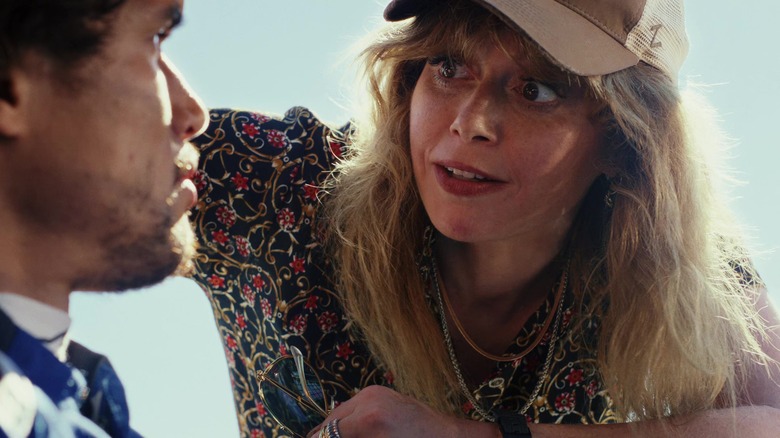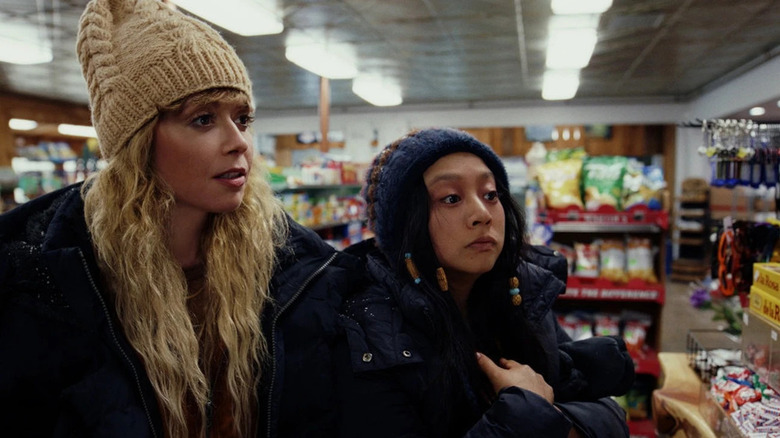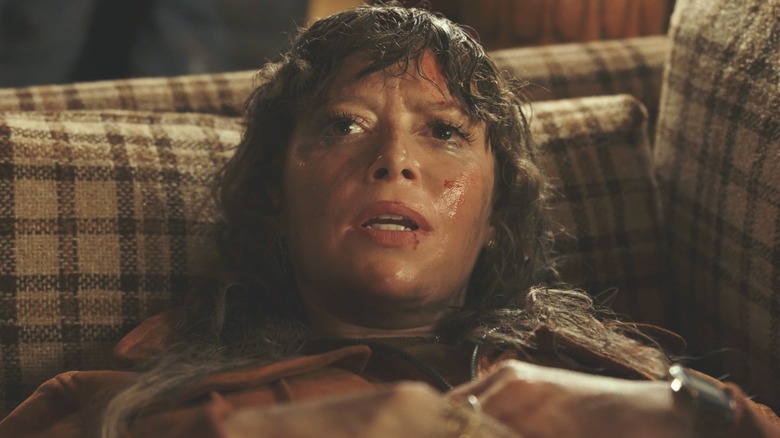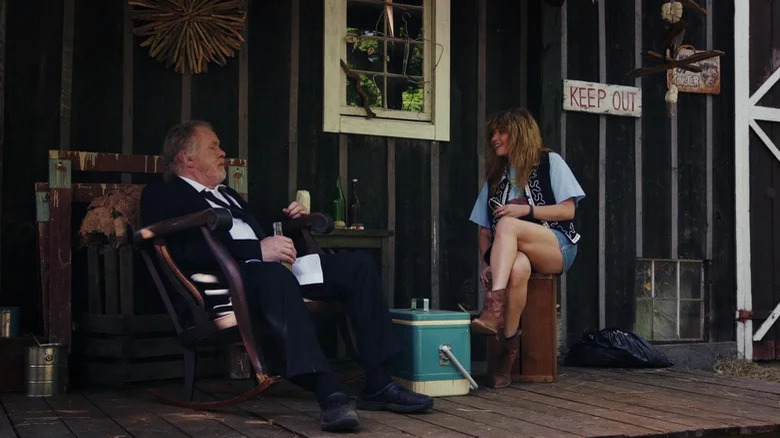Poker Face Is Not A Meta Mystery Series, And That's Why It's So Good
Warning: This article contains major spoilers for the eighth and ninth episodes of "Poker Face" season 1.
If you scroll through the "Poker Face" subreddit or any other fan forum around the show, you'll often find viewers (who otherwise seem to enjoy the series) complaining about one recurring aspect: Doesn't Charlie (Natasha Lyonne) think it's strange that people keep getting murdered everywhere she goes? "The way she just keeps stumbling upon murders/attempted murders in each episode really takes me out of it," one Reddit user wrote. "I hope they offer some sort of explanation for this in season 2...even if it's fantastical."
Indeed, the show has yet to provide any explanation for this strange phenomenon Charlie's found herself in the middle of. Not only are there no answers provided, but Charlie herself doesn't seem to notice what's going on either. She appears to remember the events of previous episodes, sure, but she never displays any signs of déjà vu when a new acquaintance of hers end up murdering another new acquaintance. Her detective skills have gradually improved over the first season, yet Charlie still goes about every mystery with a level of care and attention you would expect from someone who doesn't come across this stuff often. Whenever a new murder happens, Charlie's always taken by surprise.
An old-fashioned show
For fans of old case-of-the-week detective shows (like "Columbo," which "Poker Face" is clearly inspired by), none of this probably seems unusual. But for a lot of modern viewers, this approach seems to have broken their brains a little. Why isn't Charlie constantly wondering if she's been placed under some sort of curse that kills a new person in every town she visits? Why isn't she making little comments like, "Oh come on, this again?" every time someone dies under suspicious circumstances? It's not unusual for a modern show or movie to forgo realism for the sake of the plot, but to do so without throwing in meta jokes pointing it out? Nowadays, that's almost unheard of. How are we supposed to get behind this show's premise without the regular dose of snarky self-awareness we've grown accustomed to?
The answer is that you're just going to have to get over it. This is a show that's tired of the constant self-awareness that modern media's obsessed with, and gracefully decides to ignore it altogether. There are plenty of jokes, sure, but at the end of the day the stakes of Charlie's situation are always played straight. When Charlie's sad about the death of her new friend, the show wants us to feel sad with her, and when she outsmarts the villain yet again (often through some plot contrivances that don't 100% hold up to scrutiny), the show wants us to genuinely cheer her on. Although it might seem like the boldest quality of "Poker Face" is the way it embraces an episodic TV structure in a landscape that prioritizes serialized television, the most ambitious thing about the show is just how sincere it's willing to be.
Case in point...
Season 1's penultimate episode, "Escape from S**t Mountain," is a perfect example. It's an episode with an aggressively silly premise if you think about it: Charlie gets hit by a speeding car, is presumed dead, is thrown into a hole where another dead body is buried, and then manages to crawl her way back to the motel where the guy doing the hit-and-run is staying. Then there's the added plot contrivance of her recently-acquired kleptomaniac friend Morty (Stephanie Hsu) just so happening to stop by in her stolen car at the same motel.
While the show seems perfectly aware of how unlikely all these events are, it doesn't waste time trying to console any of the nitpickers in its audience. It understands that we're here for another cozy mystery story with interesting characters. We're here to see plot devices be introduced in one act and end up being super important in a later act, to watch as characters underestimate Charlie and accidentally end up telling her what she needs to know.
When Morty is killed, we still feel for her, and when Jimmy (David Castañeda) reveals his more sympathetic side, we feel for him too. As fellow /Film writer Danielle Ryan has pointed out, Charlie's unique among TV detectives — usually a pretty cold bunch — in that she's genuinely empathetic towards the people around her. She forms attachments easily and, without even trying to most of the time, she puts people at ease to the point where they'll tell her pretty much anything. Because Charlie treats what's happening around her seriously, without the usual ironic disposition audiences have come to expect, the audience is willing to take it seriously too, even if some of what happens stretches credulity.
A show where everything matters
The eighth episode, "The Orpheus Syndrome," features a sequence with Charlie sneaking around a building inside a horse costume. It's one of the funniest moments in the show, which just makes it all the more impressive that this episode is also "Poker Face" at its darkest and most introspective. Charlie bonds with a special effects artist, Arthur Lupton (Nick Nolte), who feels guilty over a deadly on-set accident from decades earlier. It's one of the few moments where Charlie does, in fact, allude to the absurd string of deaths she's encountered so far, but it's not a joke. It's revealed that under her cheery façade, she's in some serious mourning, and that's exactly what allows her to bond with Arthur so quickly.
When Arthur dies not long after, Charlie sets out to expose his murderer, Laura (Cherry Jones), who turns out to have been responsible for the accident Arthur's been beating himself over for half his life. In the end, however, Charlie doesn't really have to do anything: Arthur came up with a plan before his death to expose Laura, and the plan works. Laura winds up having a string of panicked, guilt-ridden hallucinations that culminate in her throwing herself off a balcony. It's an atmospheric sequence taken straight out of a horror movie, and the tonal shift succeeds because of how much the show simply goes for it, without an ounce of self-consciousness or hesitation to be found.
After the season finale of "Poker Face" airs tomorrow on Peacock, we're sure going to miss having our weekly hang-out show with Charlie Cale. But more than the mysteries or the fun plot twists, it's the show's unrelenting, old-fashioned earnestness that we're going to miss most of all.



